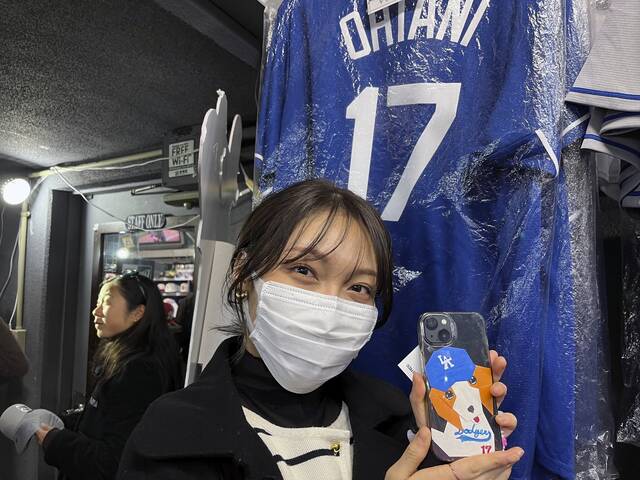Mai Fukuo was shopping for a present for a friend in Seoul, South Korea. Hideki Chiba was also in a sports store in Tokyo, looking for a gift for his father-in-law.
Both Fukuo and Chiba chose items in blue, specifically the Los Angeles Dodgers Blue. This reflects the color trend in Tokyo since Shohei Ohtani signed a $700-million, 10-year contract with the Dodgers, resulting in a color revolution.
Angels caps have nearly disappeared in Tokyo. A Dodgers cap has become a fashionable item, resembling designer-label goods.
Takuto Yamashita, a part-time worker at a store called Selection, noted that Ohtani has transformed their store. They have the largest range of MLB and Japanese pro teams' gear, and the presence of Ohtani has greatly impacted sales.
The Dodgers made a significant investment in Ohtani, not just for his baseball skills, but also for his celebrity status in Japan. This was aimed at promoting the Dodgers as Japan’s team, making them more significant than other teams in Japan.
Yamashita mentioned that the store has drastically changed from being predominantly red to now being predominantly blue, all thanks to Ohtani's influence.
Fukuo considered a classic white jersey with “Dodgers” written across the front. She viewed it as a combination of Dodgers and Ohtani attire and admired its appearance, size, and texture.
Fukuo expressed her intention to purchase the t-shirt for her co-worker due to Ohtani's fame in Japan and internationally. She believes her co-worker, a baseball enthusiast, would appreciate it.
Chiba added a typical Dodgers cap to his shopping basket while in another aisle shopping.
Chiba regards Ohtani as a hero and a Japanese icon, highlighting his influence not only on baseball fans but also on the general public.
Store manager Hayato Daido estimated that about 60% of sales are Ohtani-related, including Dodgers merchandise and specific Ohtani items like t-shirts, jerseys, and keychains. Assistant store manager Takato Suzuki suggested the percentage might be as high as 70%. Daido indicated that approximately 10% of sales were associated with local teams such as the Tokyo Giants.
Daido mentioned that Ohtani-related sales have increased significantly, about four to five times more since the Dodgers announced his signing in December. This surge in sales has not occurred for Yoshinobu Yamamoto, who joined the Dodgers on a record-breaking contract.
Daido is confident that there will be a demand for Yamamoto's gear, but they are currently awaiting its arrival.
Interestingly, Ohtani caps and jerseys from his six years with the Angels are still selling well.
This is due to the fact that they are no longer in production and have become collectible items, according to assistant manager Suzuki.
The store is reminiscent of a museum dedicated to Ohtani, featuring posters, memorabilia, and various items with “Sho-time” emblazoned on them. There are also a few Ichiro Suzuki shirts available for sale, serving as reminders of the legendary Hall of Famer.
Shirts with Ohtani’s dog are very popular items — Dekopin in Japanese, but known as Decoy in English. The next popular item might be anything related to his unexpected marriage.
Being a fan of Ohtani comes with a cost — and it can be high. The regular Dodgers cap, like other MLB caps, costs about 6,300 yen — about $42.
However, items specific to Ohtani are much more expensive. A traditional blue Dodgers cap with the interlocking LA on the front, which also features No. 17 on the side and a replica of Ohtani’s signature is priced at 22,400 yen — about $150.
If you want a baseball that Ohtani threw in a game on April 27, 2023 — be prepared. The cost is a whopping 3.3 millon yen — about $22,000. An Ohtani-used glove sells for almost 2 million yen — $13,400.
Taiwanese Torben Lin had a different opinion. While shopping in town, his interest was in buying a Masataka Yoshida jersey, the Japanese outfielder who wears No. 7 for the Boston Red Sox. He passed on the Ohtani gear — intentionally.
“Ohtani is a talented player. He’s really good,” Lin said. “He has two or three skills. But to be honest, I think he’s not perfect. You know, it’s not like we all need to buy his stuff. His souvenirs. His shirts. I think we need to support other players.”
That perspective didn’t discourage Hina Kishi. She works as a waitress in a Japanese restaruant, admired a blue Dodgers jersey on the rack and said she intended to buy it. Even after she looked at the price of 77,000 yen — about $510.
“Very expensive,” she said, muttering about how she’d work the spending around her payday. She said she works wearing a kimono, a wrap-around garment and Japan’s traditional dress. She said the jersey would offer a “different look.”
“I saw baseball in person for the first time at the World Baseball Classic last year at the Tokyo Dome,” she said. “I respect Ohtani so much for being the best and also such a good person.”
She said she was so taken that she flew to Los Angeles shortly thereafter to see Ohtani play with Angels.
Fans seem willing to pay to be dressed like Ohtani with demand increasing and profits to share. A store employee said a blue Dodgers cap with a script “D” above the bill — being worn frequently in spring training — nearly sold out in a few days.
“They talk about Ohtani on Japanese news every day,” Suzuki, the assistant manager, said. “We can’t think of what business would be like without him.”
The same goes for MLB and the Dodgers.



